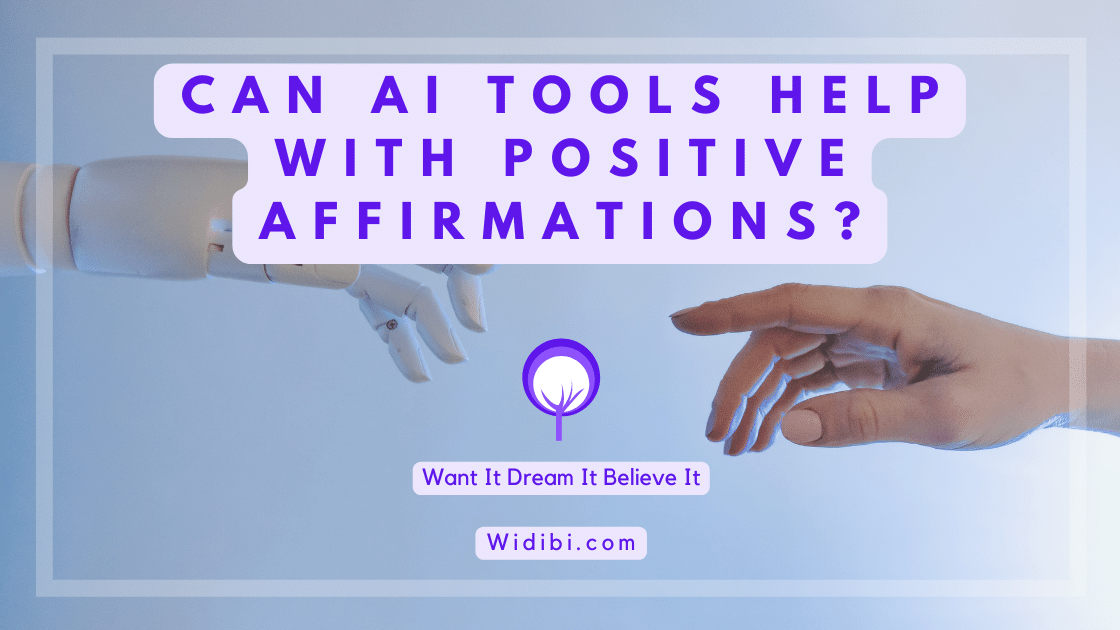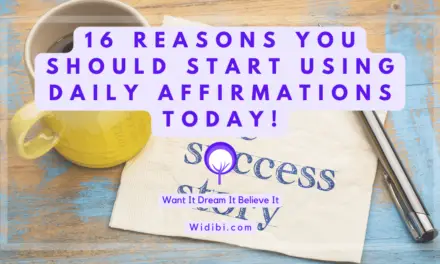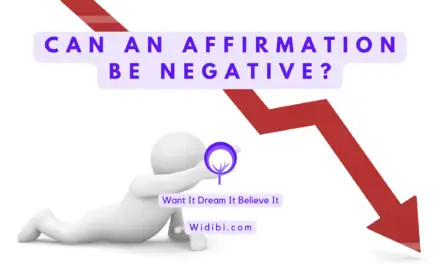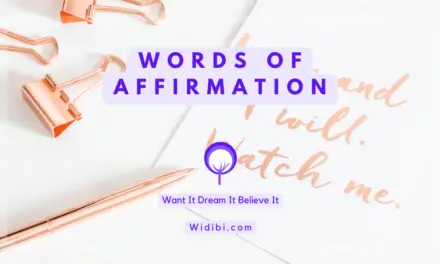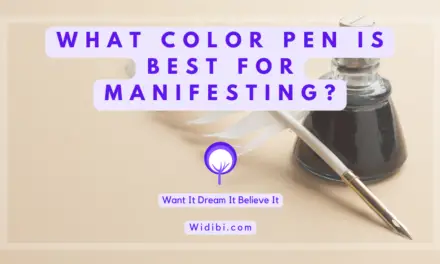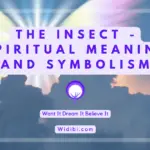While I wouldn’t quite consider it as being truly mainstream yet, you might have heard of the rise of artificial intelligence. Don’t worry; we’re not about to live out the real life version of Terminator 2. The source of the interest and excitement revolves primarily around a tool called ChatGPT. In the simplest terms, it’s a chatbot, but if all you’ve ever encountered is the kind that attempts to connect you to a real person when you’re late on a utility bill, this one represents so much more. I believe that artificial intelligence affirmations could make a massive difference to the live of people that use affirmations for confidence, manifesting or anything else.
I’ve been playing around with the AI tool for a few weeks now, and I wondered what it might mean for the Widibi audience. I have quite a few ideas up my sleeve, but I decided to start with affirmations because I believe them to be the most obvious connection.
My Experience with Artificial Intelligence
I’ve always had more than a passing interest in artificial intelligence. Admittedly, I’ve know for a while that text was always going to be one of the first targets. As a writer, it makes you worry sometimes. I consider myself a decent writer, and that makes me fortunate. It will take a while before artificial intelligence reaches a point that it can replace me, and all being well, I’ll be long retired when the time comes!
However, in my experiments with ChatGPT, I feel that the technology has already raised the barrier to entry. Anyone thinking about becoming a content writer needs to think twice if they’re targeting the lower end of the market or planning to charge a few cents per word – something I’m very familiar with. But that’s a topic for a different time; let’s be positive and talk specifically about positive affirmations.
A New Approach to Writing Positive Affirmations
If you use affirmations already, consider when, why and how you started. If you’re anything like me, you’ll have Googled some examples. It doesn’t take long to understand the structure of them and what they should look like – I’ve included a cheat sheet I made some time last year below so you can see what I believe goes into a great affirmation.
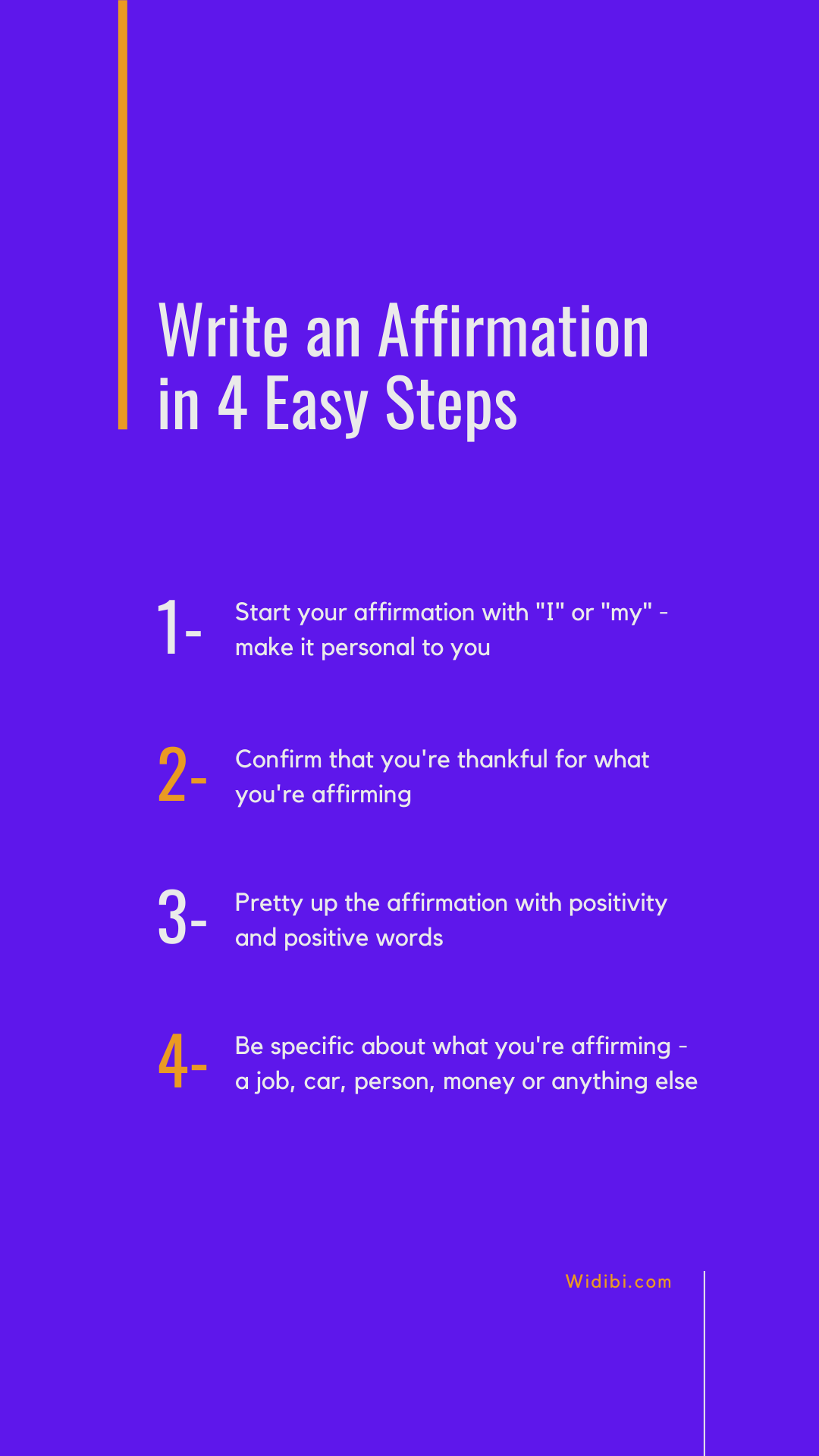
Once you have that in place, you can start to think about creating affirmations that resonate with you personally – but a lot of people never write their own. Instead, they come to sites like Widibi for guidance and inspiration. Take this post on affirmations for friendships that I put together last year. My goal with that article was to provide people seeking affirmations to help them keep their friends and to make new ones. The power of positive affirmations extends to every aspect of life, and whether readers took those suggestions and used them as is, or used them as the basis to unlock their own mindset, I’m happy with that (and thanks to anyone that has used them as part of their daily routine – I hope you experienced fantastic results!).
Now, if you’re happy to read and use positive affirmations from a list on a website (or spoken in a YouTube video, shared on TikTok or wherever else), I think that artificial intelligence could be extremely beneficial.
That’s because I don’t think that affirmations based on artificial intelligence are all that different to those that you’ll find on a website. Indeed, given a chance, I think you’ll discover that they’re even better.
It comes down to ensuring that you are confident that the affirmations you use are specific to you. To oversimplify it, if you want a red car, there’s no point in affirming that you’re going to manifest a blue one.
I wrote those affirmations for friendships by hand and off the top of my head in the belief that they are powerful and will get people what they want whether they choose to read them, write them or listen to them. However, it is physically impossible for me or, indeed, any human to overcome the fact that 16 affirmations on any topic won’t be perfectly relevant to the billions of people around the world. That’s not to say they won’t work in their own way, but artificial intelligence has an advantage over the human brain, that being machine learning.
I know what I know, and everything I write is based on personal experience. That’s one of the advantages I have over AI as a writer – it is not capable of lived experience. As such, it can’t make decisions based on its existence. What it can do, however, is improve its knowledge of certain topics. This article goes into detail on how ChatGPT is trained, and makes a point of stating that the technology is not connected to the internet. At the time of writing, it is trained on information up to 2021.
Take the Super Bowl for example:
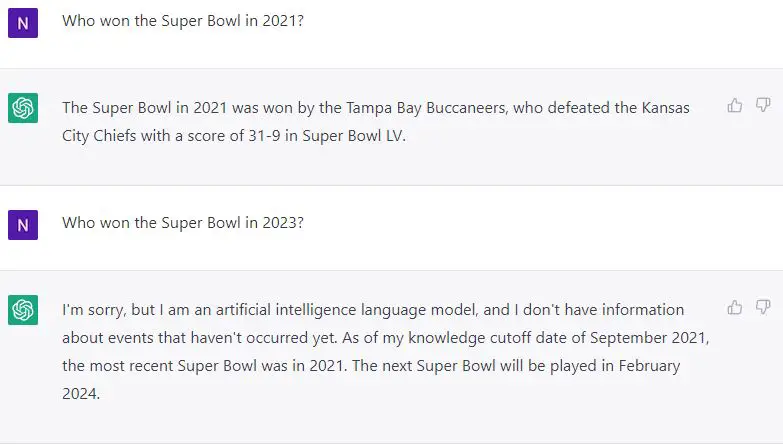
As I write this, the 2023 Super Bowl (LVII) took place precisely 12 days ago. While an incredible game, I won’t spoil it for anyone that has been living under a rock for a couple of weeks!
So, what does this have to do with affirmations? Well, affirmations are, by their nature, not particularly time sensitive. Much of what the general public wants today, they also wanted in 2021. If you want an affirmation to help you ace a job interview, you could probably make the same statement today as you’d have made in 1950, and the algorithm can help you come up with something.
Asking ChatGPT for Affirmations Relevant To Your Life and Mindset
So, let’s see it in action. One of the golden rules of artificial intelligence right now is that the more you give it to work with, the better the output will be – but it’s not like you can’t keep trying if you’re not happy with the results.
Let’s start with an easy one – daily affirmations for self love.
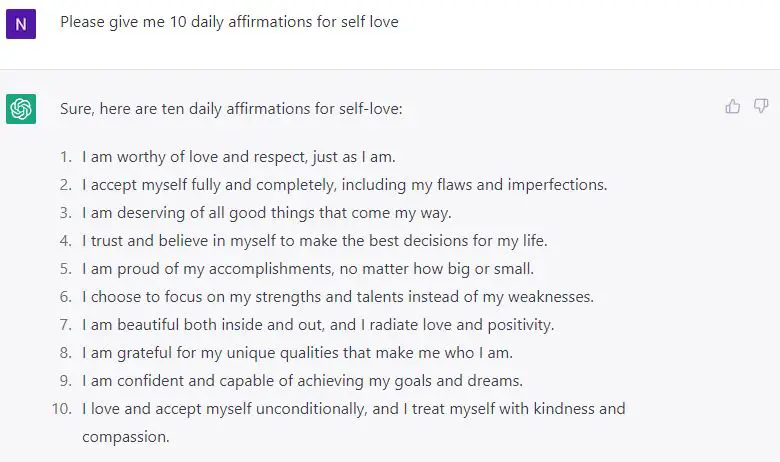
If you’ve Googled the term or watched all available videos on self love affirmations, you’ll find that these suggestions all feel somewhat familiar.
But, like I say, that’s an easy one. Let’s crank up the difficulty slightly and make it a little more specific – affirmations to ensure you’re going to get the job after today’s interview.
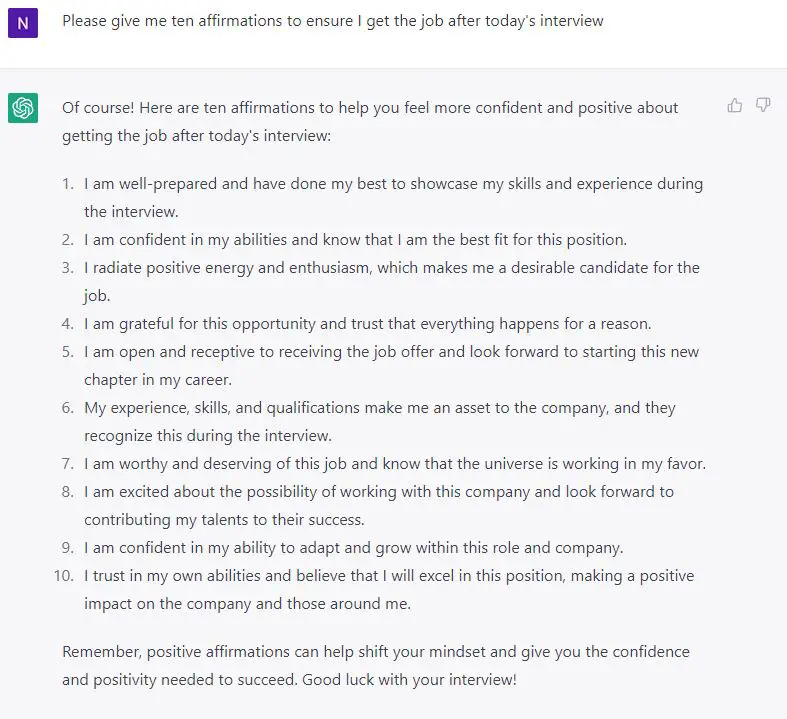
There’s even a little ‘good luck’ message at the end of that one!
Affirmations are also my favorite building block for manifesting. If you’re the same and have eclectic tastes, you could search Google for hours without finding the key affirmation to bring something unique into your reality.
I just Googled the term “affirmations to manifest a red Ferrari.” Nobody has covered it – although I might, I could go for a red Ferrari myself!
Google didn’t help (although that might change when they get their Bard tool working properly). Stress not – ChatGPT has us covered, along with some unsolicited but helpful advice:
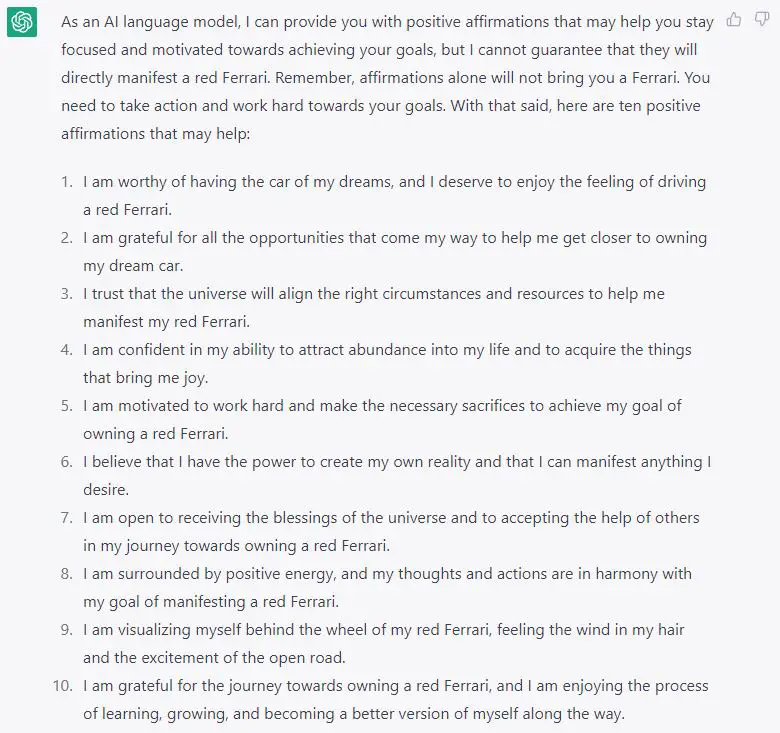
Incidentally, if you’re looking for ways to put those affirmations to work and take the suggested action, try the 5×55 method or check out my guide to creating a manifestation list.
Specialist AI Tools for Affirmations
Playing around with ChatGPT certainly piqued my interest in finding out whether this technology was ready to support and benefit us in a whole host of topics that I cover here at Widibi, but I’m certainly not the first to think of it. Suppose you’re trying it for the first time. In that case, I’d definitely recommend trying ChatGPT first, not only because it works better than any other general tool I’ve tried but it’s completely free (with a paid upgrade if you’re so inclined – I borrowed an account for this article to make sure I didn’t get stuck in the queue).
If you’re as interested in the possibilities as I am, I’d like to bring some other tools to your attention. They’re not necessarily available to the public, but they’ll give you an idea of how artificial intelligence is becoming an important component of topics that are potentially linked to affirmations, personal development and self-love.
Wysa
Wysa is a tool that already works with the NHS in the UK, Washington University and other organizations in an effort to use the potential of artificial intelligence to solve some of the concerns around mental health. The plan is to make mental health support accessible and affordable to all while ensuring that nobody misses out on access due to staff limits or anything else.
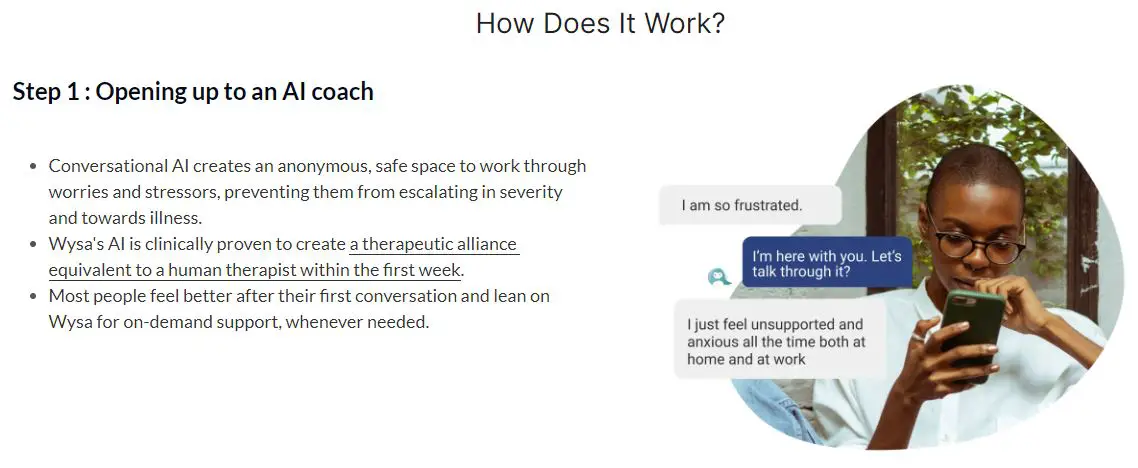
It is based on cognitive behavioral techniques and has demonstrated great success in clinical trials, together with positive user feedback.
Moodfit
Moodfit strikes me as a more consumer-focused version of Wysa. While Wysa seems to be designed for large-scale commercial use, Moodfit attempts to solve similar issues but the fact that it’s available on the App Store with plans starting from a few dollars per month demonstrates that it’s for regular people.
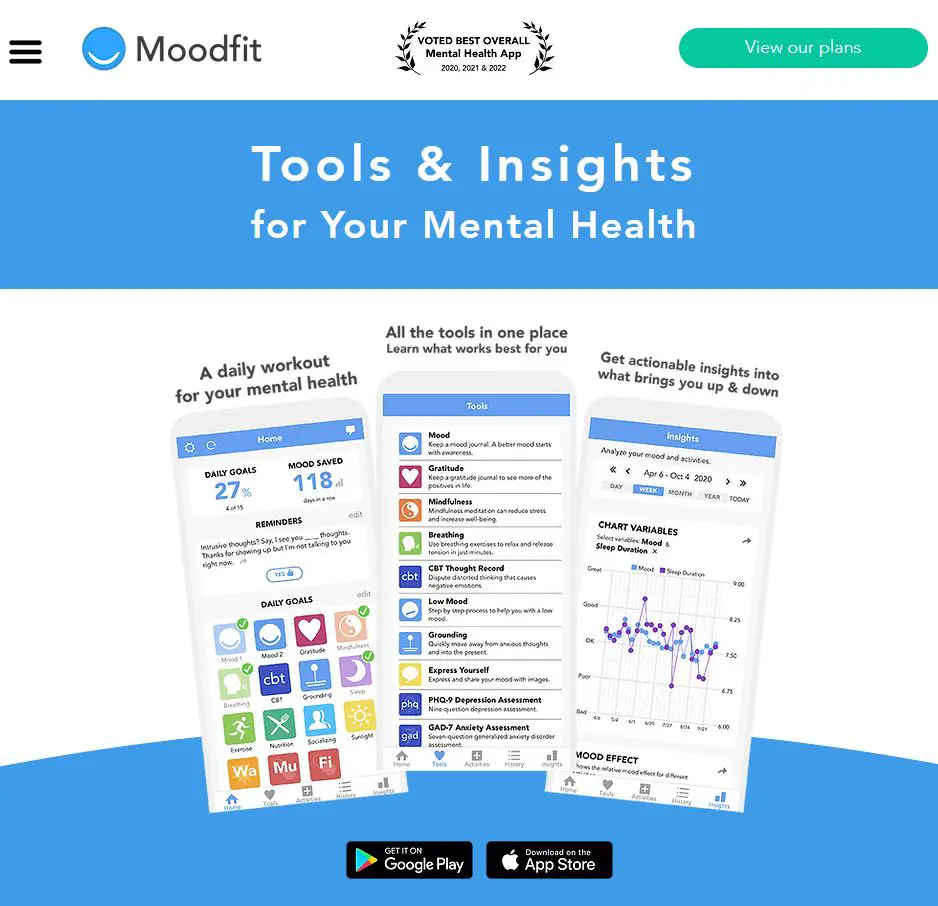
You’ll notice in the above image that part of Moodfit’s package involves gratitude and mindfulness – both key components of affirmations. The app can help with the crucial process of regularly repeating the same commitments, as that can reinforce the feelings your affirmations cause or help manifest your goals.
Putting AI Affirmations Into Practice
Always remember that affirmations alone are just words. Whether you use your voice, write them down or use another method, you set yourself up to succeed when you’re willing to believe what you say. In my view, it doesn’t matter who creates the affirmation – the “magic” is in how it makes you feel and what it makes you think.
Of course, consistency matters, and you should try to find a way to use your affirmations in a way that works for you. One of the quickest and easiest ways to get started is to write them down on a manifestation list, so check out that article and the examples to start your affirmations journey as easily as possible.
